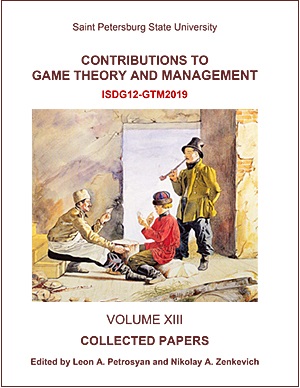Games and Network Structures on Corruption, Income Inequality, and Tax Control
DOI:
https://doi.org/10.21638/11701/spbu31.2020.09Abstract
The income tax system is the main instrument of fiscal policy that aims to improve income distribution and economic growth, but the problem arises when there is corrupt behavior in that system. While the tax audit is a tax control tool that is costly, the tax system should guarantee, however, the instruments for tax collection. In this research work, we formulate a model in which all taxpayers decide to pay taxes or not according to their personal income, individual preferences with respect to the audit and tax control information perceived in their social environment. We develop a theoretical model to study the structure of citizen networks that must pay taxes. First, we assume that citizens are classified by two social groups, the rich and the poor. When all citizens are taxpayers, but public authorities are corrupt, we show that the poor group is the most affected by corruption. However, when taxpayers are corrupt or tax evaders, we implement mechanisms to audit and control this corrupt behavior. Hence, we show that this situation of corruption and control of tax payments can be represented by several well-known theoretical games. Then, we apply the evolutionary theory of the game in the network considering that each taxpayer receives information from his\her neighbors about the probability of audit and that he\she could react according to his\her risk status and real income. Such behavior forms a group of informed agents that propagate the information beyond the proportions of the informed and uninformed contributors that are modified. Our evolutionary model in the structure of the network describes the changes in the population of taxpayers driven by the impact of information on the future fiscal audit. Our simulation analysis shows that the initial and final preferences of taxpayers depend on important parameters, that is, taxes and fines, audit information and costs.
Keywords:
behavioral economics, corrupt behavior, income distribution, income taxation system, network games, population games
Downloads
References
Downloads
Published
How to Cite
Issue
Section
License
Articles of "Contributions to Game Theory and Management" are open access distributed under the terms of the License Agreement with Saint Petersburg State University, which permits to the authors unrestricted distribution and self-archiving free of charge.




